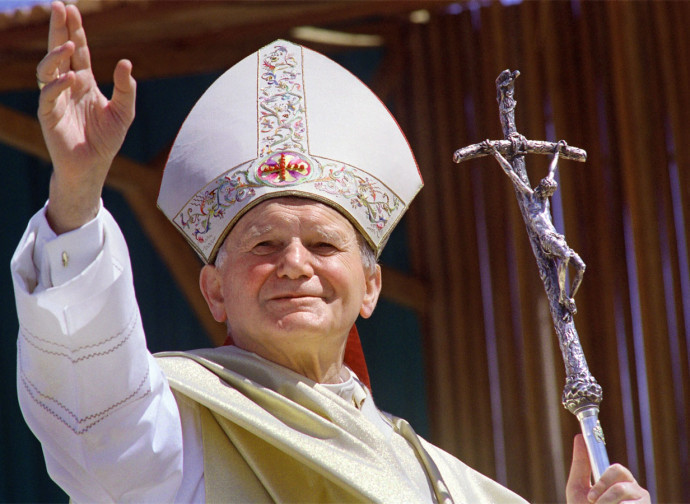Saint John Paul II
“The greatest gift that my Immaculate Heart has obtained from the Heart of Jesus”, Our Lady said about St John Paul II during one of her apparitions in Civitavecchia. That message is an admirable synthesis of the life of Karol Wojtyla (1920-2005) and his 26 ½ years of pontificate, marked by a deep bond with the heavenly Mother.

“The greatest gift that my Immaculate Heart has obtained from the Heart of Jesus”, Our Lady said about St John Paul II during one of her apparitions in Civitavecchia. That message is an admirable synthesis of the life of Karol Wojtyla (1920-2005) and his 26 ½ years of pontificate, marked by a deep bond with the heavenly Mother.
From reading St Louis Marie de Montfort he drew the motto Totus tuus and the awareness that devotion to the Blessed Virgin is the most direct way to find Jesus and belong to Him totally. He attributed surviving the assassination attempt on 13 May 1981, the anniversary of the first Fatima apparition, to her protection. And on 25 March 1984 - deviating from the prepared text - he asked her to enlighten “especially the peoples whose consecration you are waiting for”, referring to Russia, which Our Lady had asked to consecrate to her Immaculate Heart in order to stop the spread of the errors of Communism. On the same occasion she had said: “In a special way we entrust and consecrate to you those men and nations who are particularly in need of this entrustment and consecration”.
Flanked by Cardinal Ratzinger, whom he put in charge of the Congregation for the Doctrine of the Faith, the Polish saint left as legacy a very rich magisterium, confirming many truths of faith and morals and rejecting the various Modernist demands he found himself facing. He defended and motivated ecclesiastical celibacy, confirmed the impossibility of conferring priestly ordination on women, fought Liberation Theology, reiterated the immorality of contraception, condemned abortion and euthanasia as products of the “culture of death” (he himself had been born thanks to the strength of his mother, who had resisted her doctors’ advice to abort him), urging every Christian to publicly affirm the inviolability of human life. Aware of the seriousness of the satanic attack on human nature, he founded the Pontifical Institute for Studies on Marriage and Family (dissolved and founded again on different bases by Pope Francis following his Motu Proprio Summa Familiae Cura). He held splendid catecheses on “Theology of the Body”, centred on the meanings of sexuality according to divine design.
Among the great fruits of his pontificate is the Catechism, whose publication he promoted and which he defined as “a safe and authentic reference for the teaching of Catholic doctrine”. In addition to the many encyclicals on specific themes, the Veritatis Splendor remains fundamental. In it he fixed the Church's lifelong teaching on morality, clarifying the relationship between truth and freedom and recalling the existence of absolute moral norms from which conscience can never derogate. Three of the five dubia presented in 2016 to Pope Francis on Amoris Laetitia are based precisely on key passages of VS, which for the four cardinals who requested clarification must be reiterated to avoid non-Catholic interpretations of AL, already widespread in some dioceses.
In dialogue with other religions he took significant steps towards the Jews, whom he called “elder brothers”. But he warned against slipping into religious indifferentism, aware that only Christ is the Saviour. With regard to Islam, he wrote of the need for “a correct relationship” and “to be aware of the notable gap between European culture, which has deep Christian roots, and Muslim thought”, urging “Christians who live in daily contact with Muslims to be adequately prepared to know Islam objectively”. He invited the institutions to promote religious freedom in Europe and at the same time called for reciprocity in countries where Christians are a minority (cf. Ecclesia in Europe, 57).
St John Paul II therefore understood the greatest challenges for the Church today. He lived as a true lover of Christ, as he manifested to the world by embracing the cross until his last earthly breath and as was already clear from his homily for the beginning of his pontificate: “Do not be afraid! Open, indeed, open wide the doors to Christ! To his saving power open the borders of states, economic and political systems, the vast fields of culture, civilization and development. Do not be afraid! Christ knows ‘what is inside man’. Only He knows it!”.
Patron of: World Youth Days, families
Learn more:
John Paul II (Encyclicals, Messages, Homilies, etc.)
